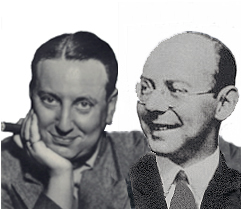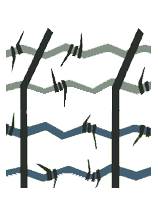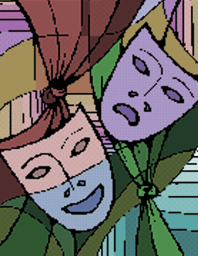|
 
| |
|
|
| |
Exile
|
|
| |
|
 |
|
|
|
|
|
|
| |
On April 2nd 1939 Max Ehrlich
makes his farewell stage appearance in Germany and leaves for Holland,
marking the start of his Dutch Exile.
There, he joins Willy Rosen’s cabaret
troupe, “Die Prominenten”, in The Haag. The Spa Season at Dutch seaside
resort Scheveningen begins in mid-May, and Volle Kraft Voraus
(Full Steam Ahead), the troupe’s new show, is set to premier on May 18th.
Max Ehrlich and Willy Rosen have been close
professional as well as personal friends since a very long time. Even
during the years while Max directed the KuBu (Jüdischer Kulturbund), Willy regularly provided
songs and music for the shows, as well as frequently returned from
abroad in order to make guest appearances on the Kubu’s stages.
Other troupe members include film diva and
soubrette Rosy Barsony, actress-singer Rita Georg, film and operetta
star Oskar Denes, film star Franz Engel, Viennese operetta star Fritz
Steiner, singer Claire Eiselmeyr, jazz pianist Eric Ziegler… and new
talent Herta von Langen.
|
|
|
|
The Cabaret’s name, Die Promentinenten (The Celebrities), is appropriate because most
of the troupe indeed are celebrities. However, it also is common knowledge that
two of the most popular stars from Willy Rosen’s troupe, Sigfried Arno
and Szoeke Szakall recently have immigrated to America, where they will
go on to successfully pursue film careers in Hollywood. So it’s welcome
news when the May 17th 1939 article in newspaper Het Volk
states that new troupe member, “Max Ehrlich, is one of the “best-known
comedians in the World”.
Still, after the past five years during
which Max Ehrlich served
as director of the Kubu’s (Juedischer Kulturbund) Kleinkunstbuehne
(light theater department), it’s frustrating now for him to assume the
role of simple cast member. Contrary to his good friend Willy Rosen, who
above all relishes the job of artistic director, Max Ehrlich is an
“Organizer” in the broadest sense and also “needs” to apply his talents
beyond the nightly cabaret performances...
|
|
"Life goes on
full of hope and we accompany it on its way..."
"When I got up this morning,
the first thing I did was look out the window.
"What were you looking for" asked my neighbor?...
"I only looked to see", I answered,
"Whether I was living overseas yet."
Louis Davids
June 1939
|
|
But at least Max Ehrlich - like almost all
of his Exile
colleagues
- feels safe from Nazi persecution here!
Like the overall Dutch population, they are convinced
that "neutral" Holland
somehow is immune from German invasion; and even when World War II
breaks out the following September, for many it will feel like something
happening far away in foreign lands. Willy Rosen has a visa for
Cuba in his passport but will continue saying, "What am I going to do over there?"
Instead, German-speaking cabaret in the Netherlands will
continue along in its habitual non-political style.
One rare Exile stage artist
who remains untouched by all the optimism is Dutch cabaret star Louis
Davids. His fears, stoked by the ever-escalating persecution inflicted
on Jews in Germany, have become a waking nightmare... one to which he
senses that a rude awakening in the Netherlands is imminent...
But, Louis Davids does not
live to see his nightmare's realization. Unexpectedly on July 1st 1939
he is dead.
The funeral-goers include
many of the
who's who from Exile cabaret: Rudolf and Herbert Nelson, Dora Gerson, Otto
Wallburg, Franz Engel... Max Ehrlich, in the name of
his German colleages, delivers the eulogy.
|
|
| |
Summer Season 1939 |
|
|
1940 |
|
|
The Cabaret Artists |
|
| |
The programs from only three of the
four revues staged by the Prominenten during the Summer Season 1939
appear to have survived, and currently are preserved in Dutch archives:
Scheveningen Lacht (Scheveningen Laughs), 1000 Worte Humor (1000 Words
of Humor) and Tempo! Tempo!
The latter revue includes Willy Rosen’s new
tune, “Aber die Traenen in meinen Augen, die siehst du nicht” (but you
don’t see the tears in my eyes), which goes on to top the 1939 season
hit-parade; and newspaper Het Volk, in an article on July 26th
1939, doesn’t hesitate to characterize Die Prominenten as the best
cabaret in Scheveningen… surpassing their main competitor, Rudolf
Nelson’s Revue, which also is appearing in this same resort.
Celebrities are to be found in the
Prominenten Cabaret’s audiences as well! Notably, during one of the
first performances of Tempo! Tempo! French singer Maurice Chevalier,
accompanied by world-famous tenor Richard Tauber, are amongst the
spectators.
Immediately seizing the opportunity of this
illustrious presence, the troupe improvises several additional numbers
during the performance. Max Ehrlich isn’t shy about doing his Richard
Tauber impersonation… and, all the while, Tauber whispers the
translation of each word into Maurice Chevalier’s ear … as is reported
in Het Volk’s July 31st newspaper article the following day! |
|
|
Nothing is known of the Prominenten’s appearances during the Winter
Season that followed. However, since elsewhere World War II has
commenced, it’s extremely unlikely that they were touring outside
Holland at that time. More probable is that they weren’t working
together during those months, and instead were appearing individually in
various different troupes.
By April 1940, Max Ehrlich is engaged at
the Theater Carré in Amsterdam. At the same time, Erich Ziegler is
accompanying dancer Cilli Wang at the piano during a one night show, Deligentia,
in The Haag.
Meanwhile, Willy Rosen is preparing for the upcoming Season in Scheveningen, which he plans to open with a new revue, Lache Bajazzo (laugh
clown Bajazzo)... a colorful mix of cabaret numbers similar to previous
ones. However, this show never will make it past its premier on May 8th
1940!
On the front page of the revue's program,
Willy Rosen writes:
| |
"We hope the public also will remain
faithful to us during the 1940 Season [...] For those who want to
forget their worries, come to us, the cabaret without politics.
(Without politics, that's the policy we've strictly followed over
the past three years and that's what we will continue to do). If you
enjoyed yourself this evening, then tell all your friends so that
they can find the same joy; and if you didn't enjoy yourself, tell
all your enemies, so that they can come here and feel aggravated." |
|
In fact, there is little
doubt that, as before, the public will remain faithful to The
Prominenten during the up-coming Season; their newest revue is
everything one has come to expect from them. But, impending events will
make it all happen the opposite way!
Early on the morning of
May 10th 1940, the German Army invades the Netherlands... and within six
days takes complete control of the country.
On the morning of May 14th 1940, some Jews
still manage to flee Holland by ship. But by afternoon this no longer is
possible as by now sunken ships block the harbors.
Max Ehrlich tries to
escape via IJmuiden Harbor; but the ship he's on is attacked from the
air and must turn around and return. |
|
|
At this time, not only
the German cabaret artists in Holland preponderantly are Jewish,
but also their Dutch colleagues as well.
Henrietta Davids in her
1948 memoirs, "Mijn levenslied", tells how these stage artists in almost
no time were back to work.
Newspaper Het Volk's May 27th . edition
announces that "Entertainment has returned to Amsterdam". There's a
variety show playing at the Theater Carré, and Henriette Davids is in
the troupe.
On the other hand, the Nazis sieze the
Tuschinski-Theater just twelve days after the invasion and redeploy it
for propoganda purposes... Although officially they claim that they have
purchased it.
|
Under the Nazis' Heel
On July 1st 1940, the
Nazis begin imposing oppressive measures on the Netherland's overall
Jewish population.
Notably, Jewish
merchants must visibly post that their shop is Jewish owned, and
all businesses under Jewish ownership must register as such.
In October 1940, the
nazi occupiers order all civil servants to provide certification that they are "Arian"...
following which, in November 1940, all Jewish civil servants are fired.
Shortly thereafter all Jewish faculty members at Universities also are
dismissed.
As of January 1941 all
Jews are required to register with the Authorities, at which time a large red "J"
is stamped in their passports. They also no longer may attend cinemas,
donate, blood or own radios.
On February 13th
1941, upon the instigation of Jewish Community leaders in
Amsterdam, the Nazis institute the Joodsche Raad (Jewish
Council) to "self-manage" the Jewish population.
Initially only
Jewish religious organizations are subservient to the Council's
control; but within a short time all Jewish organizations and
issues are dealt with by them.
From May 1941 on, services provided by Jews and those provided by gentiles
must be strictly segregated.
Finally, the
ordinance of September 15th 1941 prohibits Jews from frequenting
any public event, park, restaurant, theater, concert, librariy,
museum or other insallation not reserved solely for Jews... And
with that, as well as the other persecutory regulations and
actions already put in place, the exclusion of Jews from public life in
the Netherlands is now total, following the example set in Germany.
Protest by the general
Dutch population regarding these measures, perhaps understandably, are
almost inexistent; however, one notable exception is the "February
Strike" by Amsterdam's dockworkers, following the arbitrary arrest of 400
Jewish men... an undertaking which nonetheless receives absolutely no
coverage in Het Volk, the labor newspaper, albeit notification that "one
must return to work by the following day" is published there.
Even the Dutch resistance, which notably organizes
hiding places for Jews to go
"underground", only appears in 1943... by which time almost all the
deportations already have been carried out. |
|
|
Some employees of Abraham Tuchinski
collaborate in this action; and Tuchinski himself as well as his
closest staff members will be deported to Auschwitz and Sobibor from
where they never will return.
The night of the invaison Die Prominenten, Willy Rosen's troupe, are
in Scheuveningen set to appear on stage . They cancel their
engagement, "Lache Bajazzo", but in mid-June 1940 begin staging
revues once again... Though at this point Willy Rosen and Erich
Ziegler work solely from behind the scene, and no longer appear
on-stage.
Following Scheuveningen, they appear
in the Haag, then Amsterdam's Savoy-Caberet, followed by Utrecht...
all without any reference in the program to Willy Rosen's name.
But in December 1940 the troupe again is officially permitted to
appear in Amsterdam's Beatrix Theater, under Willy Rosen's
direction.
At first there's no news of the
Rudolf Nelson Troupe's destiny. But, in Herbert Nelson's 1984
memoirs, "Gestern ist noch nicht vorbei" he describes how he spent
the night after the invaison talking his parents out of taking their
own lives.
|
|
|
| |
| |
| |
|

